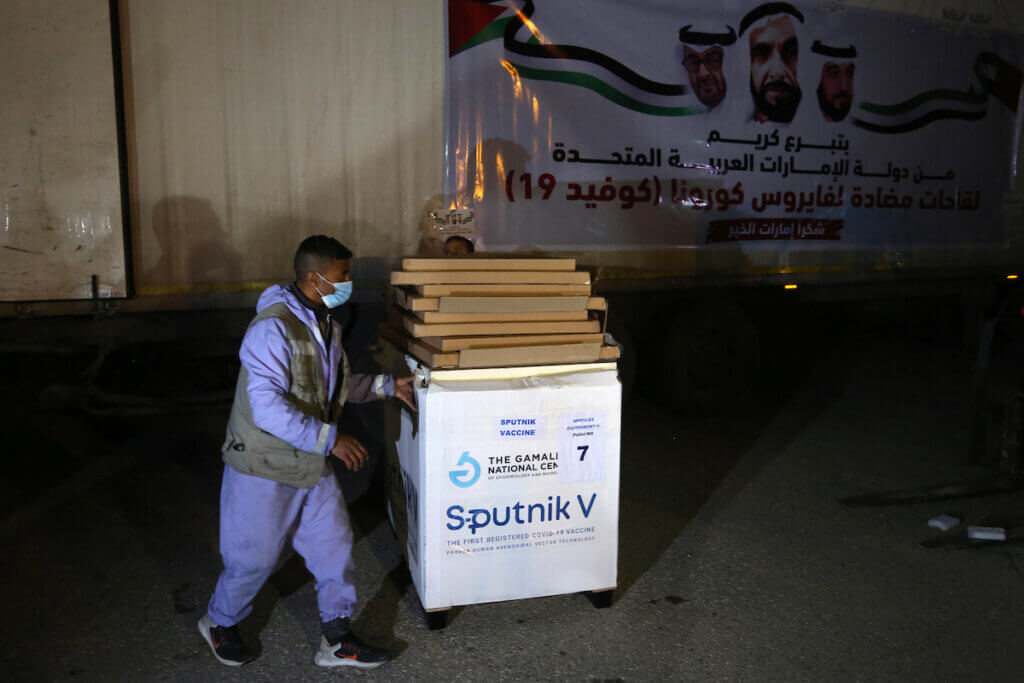In an empty ward at Al-Shifa hospital used to treat COVID-19 patients before transferring them to the specialized departments sits Dr. Mohammed Abdelmanem, a 47-year-old pulmonologist who expects to get a first dose of the coronavirus vaccine this week. The schedule was outlined by Gaza’s ministry of health, and Abdelmanem will be among the first few thousand to be inoculated out of a population of almost two million. He says he’s looking forward to finally not being afraid.
“It is really reassuring that now we can go back home without all the worries,” he said, later adding, “that was a real danger to go home every time with worry that you may infect your family.”
Indeed, that is just what happened last summer when he, his wife, and their four children all tested positive for COVID-19. While treating COVID-19 patients, Abdelmanem said he and other healthcare workers, “shielded ourselves with the simplest means: masks and the protective suits were our only forms of PPE, though myself and many of my colleagues became infected.”
Gaza has been under Israeli occupation since 1967 and since 2007 under an Egyptian and Israeli blockade, severely limiting the entrance and exit of essential goods. With medications at 50% stock and limits on the number of hospital beds, “the only option we had then was to quarantine and take some pain-killers,” Abdelmanem said.
“The kids got through it much easier than my wife who was in poor condition,” Abdelmenem recalled. “When we got infected, we separated inside the home, and those were the most painful moments.”
“For months, I could not go to see my parents, they live in the same building but I stayed away from them,” Abdelmanem said.
“Even after my family and I recovered,” Abdelmanem said, “I kept away from my older parents. I did not feel safe at all over the past year and it was an unbearable year, but I thank God that we are still alive.”

At least 1,940 of the healthcare workers have already tested positive for COVID-19 in Gaza, according to Dr. Hani Wihidi who works in the central lab for processing tests. Since the pandemic began last March 56,727 have tested positive and 564 have died. Presently, there are around 2,000 known active cases, although UN officials say that low testing supplies are likely masking a wider outbreak.
“At the beginning of the COVID-19 pandemic, we watched the casualties around the world and the situation was very tough and terrifying. Thousands of people were contracting the disease, and in developed countries health systems collapsed. It would be nightmare for Gaza if casualties were similar,” Abdelmenem said.
Before Abdelmenem receives his first jab in the arm he will be given an antibody test. If he tests positive, the ministry of health guidelines would prevent him from receiving a vaccination. While it is unknown how long immunity after infections last, most studies have shown at least six months of protection. Last December, the WHO’s Dr. Maria Van Kerkhove warned, “individuals can be reinfected with this virus,” adding, “we don’t know how often this is happening.”
Thus far Gaza has received 20,000 doses of Russia’s Sputnik V vaccine donated by the UAE and 2,000 purchased by the Palestinian Authority, which are administered at six locations across the territory. Another 40,000, also procured by the UAE, are due to arrive in the coming weeks, however, the timeline for a wider vaccination program is still unclear. Dr. Nidal Ghanim, an epidemiologist at Gaza’s central COVID-19 testing lab said at this time the ministry of health has plans to secure vaccines for 60% of the population.
Abdelmenem anticipates the rollout will be marred by delays. During the first few months of the pandemic, he said there was a crisis over a lack of testing kits that were slow to arrive.
Gaza’s ministry of health identified the priority will be front-line workers, including doctors, nurses, hospital administrative employees, EMTs, and others who are in direct contact with COVID-19 patients. The second tier will vaccinate Palestinians age 55 and older, and individuals with chronic diseases.
The ministry of health released an online application in late February for people to sign up for the roster.
“Now the atmosphere is different,” said Abdelmanem. “Doctors can be more certain of our safety, so our energy will be at a maximum.”
“Even so, I still keep social distance with my parents when I see them now. But, after I get vaccinated, I can sit with them without fear.”
Related posts:
Views: 0
 RSS Feed
RSS Feed

















 March 16th, 2021
March 16th, 2021  Awake Goy
Awake Goy  Posted in
Posted in  Tags:
Tags: 
















